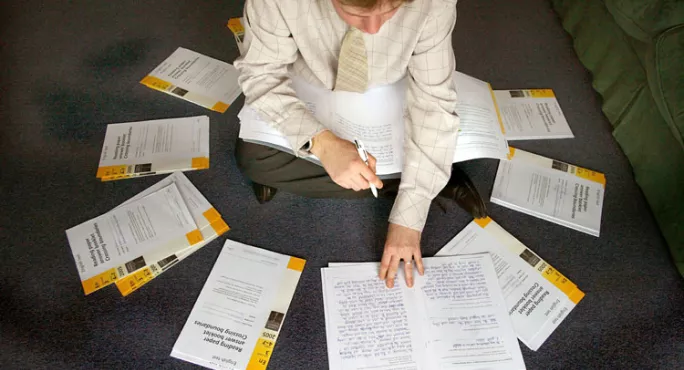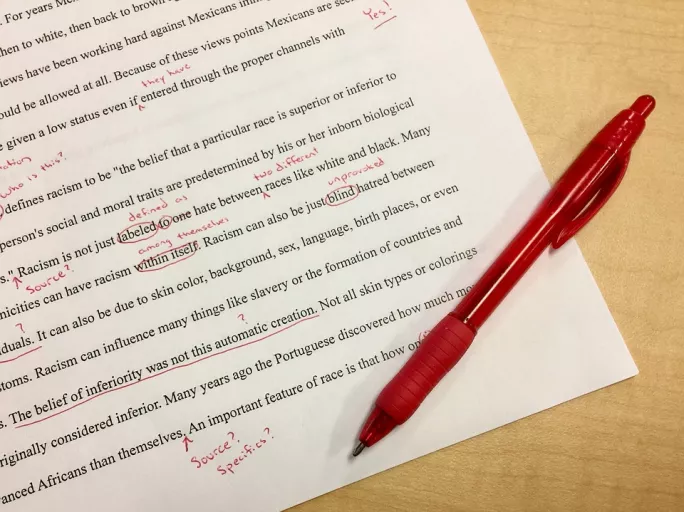- Home
- Exam appeals: a guide for subject leaders and middle managers
Exam appeals: a guide for subject leaders and middle managers

For the majority of candidates, the grades they receive on results days will be much as expected. But for the unfortunate minority, here is a quick digest of what to look for and how to take necessary action:
What are the signs of inaccurate marking?
- There is a significant drop this year compared with results from previous years, even though the profile of your cohort and your staffing and teaching practice remain similar.
- Grades are far below predictions.
- There is a noticeable dip in your subject compared with all the others, especially for your most able students.
- Your rank order is inexplicably disrupted.
- The paper looked very do-able and your candidates emerged confident from the examination…but their results do not match that first impression.
What can you do?
Contrary to popular belief, launching an investigation is not simple or straightforward; and it’s certainly not cheap. Before making any decisions here are a few things to consider:
- Did the paper go as you expected? This might explain the drop.
- Did any of your candidates express concerns about the paper or their performance which might explain the drop? I try to see candidates after their examinations so that I can have an early indication of how things went before the results are published.
- How large is the margin between your expectations and their result? Lasr year Ofqual decreed that where there is a “difference of opinion” between an examiner and a reviewer, the original grade will stand. However, it also said that if there is an error then, no matter how small, that error will be corrected.
- Everything you need to know on A-level results day
- How to navigate the exam appeals system
- Your guide to clearing
Using the exam board’s database
All boards will give some degree of breakdown of marks from the paper, and some will show you how your candidates performed compared with previous years, other centres and other centres of the same type. Based on this, you can ask yourself several questions:
- Is there a zero for a high-tariff question when you know that your candidates(s) attempted the question? This could suggest that the mark has not been recorded and should be queried immediately, especially if the candidate’s offer of a place hangs in the balance. Even online systems can fail to pick up marks. Just occasionally, examiners miss a question, in which case this needs to be marked immediately.
- Did your cohort perform in line with national expectations and with centres of your type? You could look more closely at the breakdown of marks per question to see whether the discrepancy was across the board or in particular questions.
- How did your candidates perform on different questions which require different skills? Was the marker too severe? Or is there something you could do to improve your approach to this kind of question in the future?
- Is there a clear pattern of achievement which fits with your ranking of candidates? Now that most examinations are marked online, you can no longer assume that a single examiner is responsible for the marking of your centre so a dissonant ranking might be the result of a combination of strict, accurate and lenient examiners. This will need careful unpicking.
- And, perhaps tellingly, is the marking too uniform across your cohort? If all your students score similarly on a higher-tariff question, especially if it is in the mid-range, this might indicate a marker lacking discrimination and could be worth further probing by getting a sample of scripts back.
Whatever the case, if you are investigating further by requesting scripts, make sure you use the quickest service (photocopied scripts) - otherwise you will get the original script well after the deadline for appealing.
What the photocopied papers tell you
Returned scripts will show what your candidates wrote, where and how their achievements were recognised and what mark was given. The marker’s comments are addressed to a senior examiner. They will not necessarily yield much information about the marker’s reasoning. Increasingly, it is the case that the comments will be taken only from a standardised assessment grid so will not be individualised to the candidate, especially if marked online. Or, even more impersonally, just the assessment objective (AO) and the band will be annotated.
At this stage you may well see that the marks were entirely reasonable, and identify where your candidate missed opportunities to score more highly. Clear feedback from you to the candidate and perhaps their parents will lay the matter to rest and you can all move on.
On the other hand, you may find areas of the work unacknowledged, or annotations which do not match the level of achievement in the work in front of you. In such cases the next step is a review of the marking.

What has changed for marking reviews?
A review of marking is not a re-mark. Ofqual statistics indicate that most appeals fall around the grade boundaries. It has concluded that candidates who miss their target grade by one or two marks are requesting appeals in order to get an improved grade, especially in subjects involving extended essay answers, where the result can be slightly variable.
Therefore, if the script in front of you is marginal and there is no clear injustice, it is very unlikely that a review will result in an upgrade; it is better to be upfront about this with senior leaders, parents and candidates.
However, where there is a clear misapplication of the mark scheme, the candidate can be encouraged to appeal. Our policy is always to remind people that grades, like shares, can go down as well as up. If the mark is too close to the lower grade boundary, many candidates will not want to take the risk of losing their current grade.
It may be that in some mark schemes, even for extended responses, in one AO there is just one mark difference between one band and the next. If you feel that your candidate has been placed in the wrong band, then even though there is only a difference of one or two marks, you might feel an appeal is justified. It might be helpful to explain your reasons in a covering letter to the board.
Requesting a whole-centre review
In the past, subject leaders could identify the 12 most obviously wrongly marked returned scripts with a view to a whole-centre review. They could be fairly confident that the board would agree with their judgement that the work had been under-rewarded, and thus move quickly on to a whole-centre review.
The move to online marking means that there will not be a clear pattern of under-marking because potentially many different markers will have contributed. Where scripts have been split by question and farmed out to different markers, spotting a pattern will be even harder. You can still select the 12 scripts exemplifying the degree and type of error. The best you can do is make a detailed analysis of where the marking has gone awry and communicate this to the board.
The appeals panel
Just occasionally, you may feel that the board has fallen short of its duty to provide accurate marking and you will need to take your appeal further. There are two stages in this appeal: the first is responded to remotely by the exam board; the second stage takes the form of a hearing.
In the past, the centre and the teacher would have to find where the board’s procedures have broken down. They would not be able to challenge the marking itself. Case histories of previous appeals make for very interesting reading, and can be tracked down on the internet. A lot can be picked up from past failures and successes to help you in your appeal. Even so, centres are very much on the back foot when trying to find a way through procedures that are not their own, and on which they cannot possibly be expected to be expert.
However, things may be about to change. Last year, in a pilot exercise, Ofqual changed the practice in three subjects: geography, physics and religious studies. If you are dissatisfied with the results in any of these subjects you can now challenge the ways in which marks have been awarded. It will be interesting to see whether the outcomes will lead to a roll-out across all subjects.
Grades do not define people
Ideally, every candidate would receive the grade they deserve, markers would make the right judgements and boards would pick up all errors before the results hit the centres’ IT systems. But this is an imperfect world. Examining is done under enormous time pressure: most markers are teachers carrying an ever-increasing workload, so fatigue will get in the way.
We also need to remember that our candidates still have the capacity to surprise us. In this Olympic year we have seen top gymnasts miss the bar (and thus miss out on medal hopes) while outsiders achieve medals, so how can we expect all of our students or ourselves to succeed all the time? Win or lose, what is most important is to work for the best outcomes, have good contingencies in place and learn the lessons for next year.
Good luck!
Yvonne Williams is head of English at Portsmouth High School
For full access to all our A-level coverage, click here, and for GCSEs, here.
Want to keep up with the latest education news and opinion? Follow Tes on Twitter and like Tes on Facebook
Keep reading for just £1 per month
You've reached your limit of free articles this month. Subscribe for £1 per month for three months and get:
- Unlimited access to all Tes magazine content
- Exclusive subscriber-only stories
- Award-winning email newsletters



